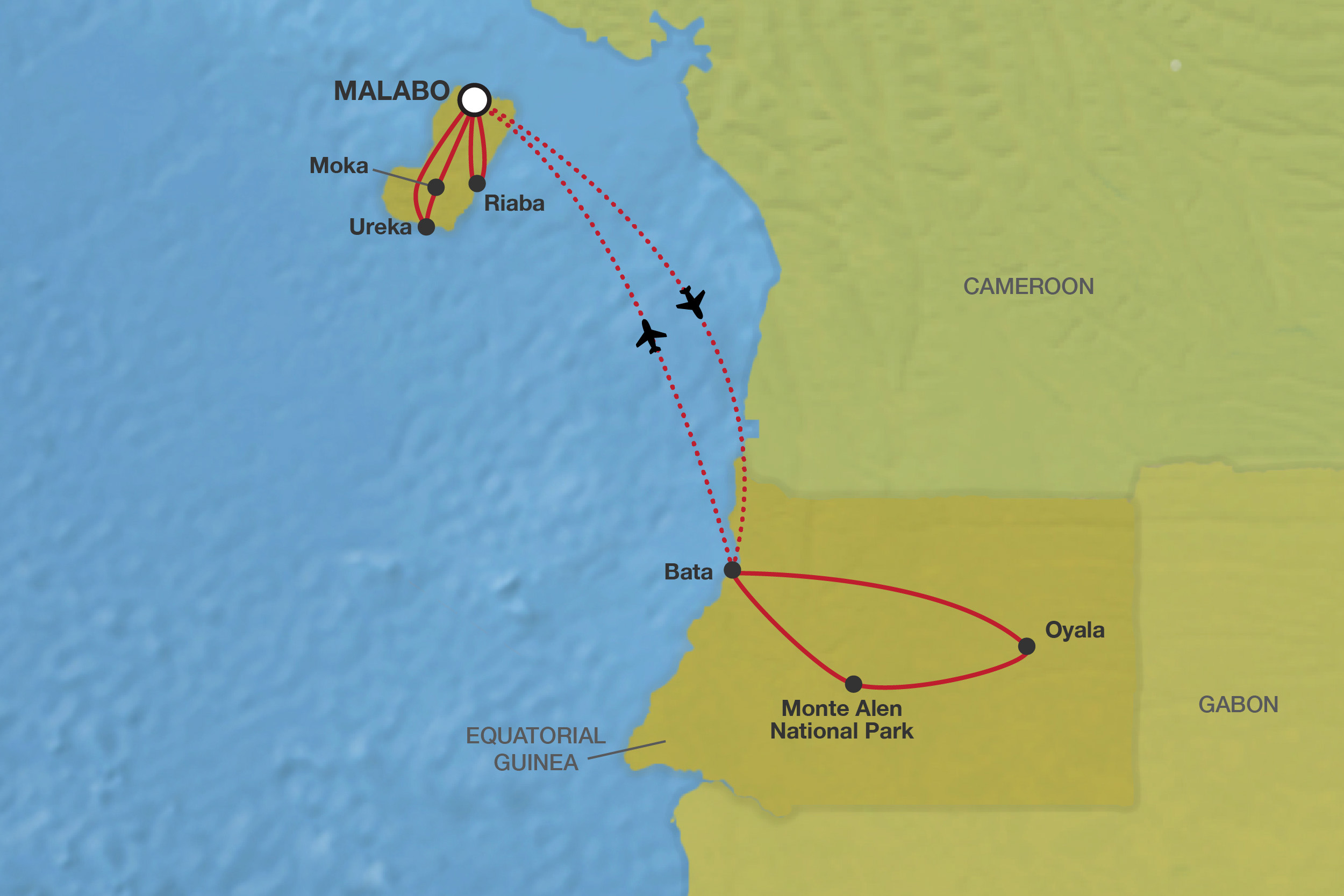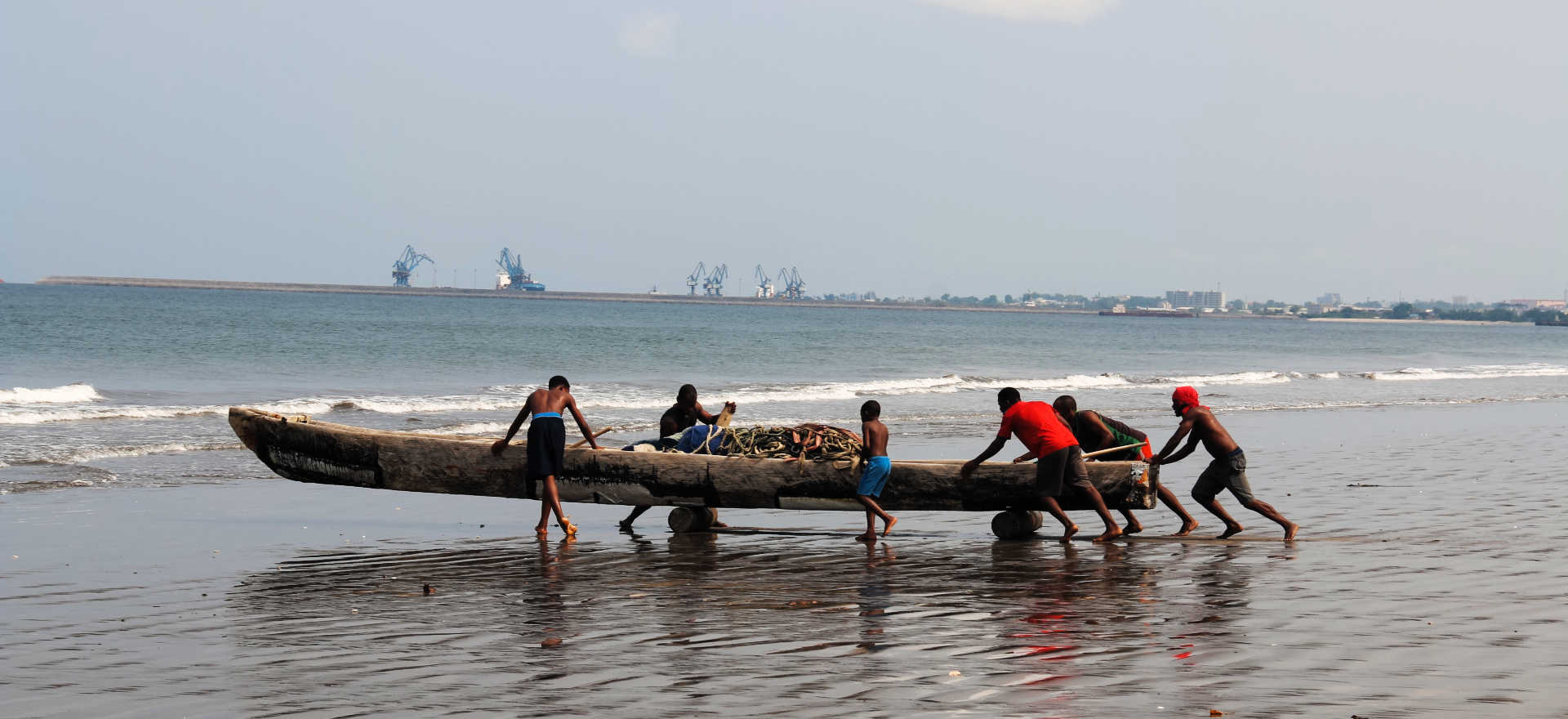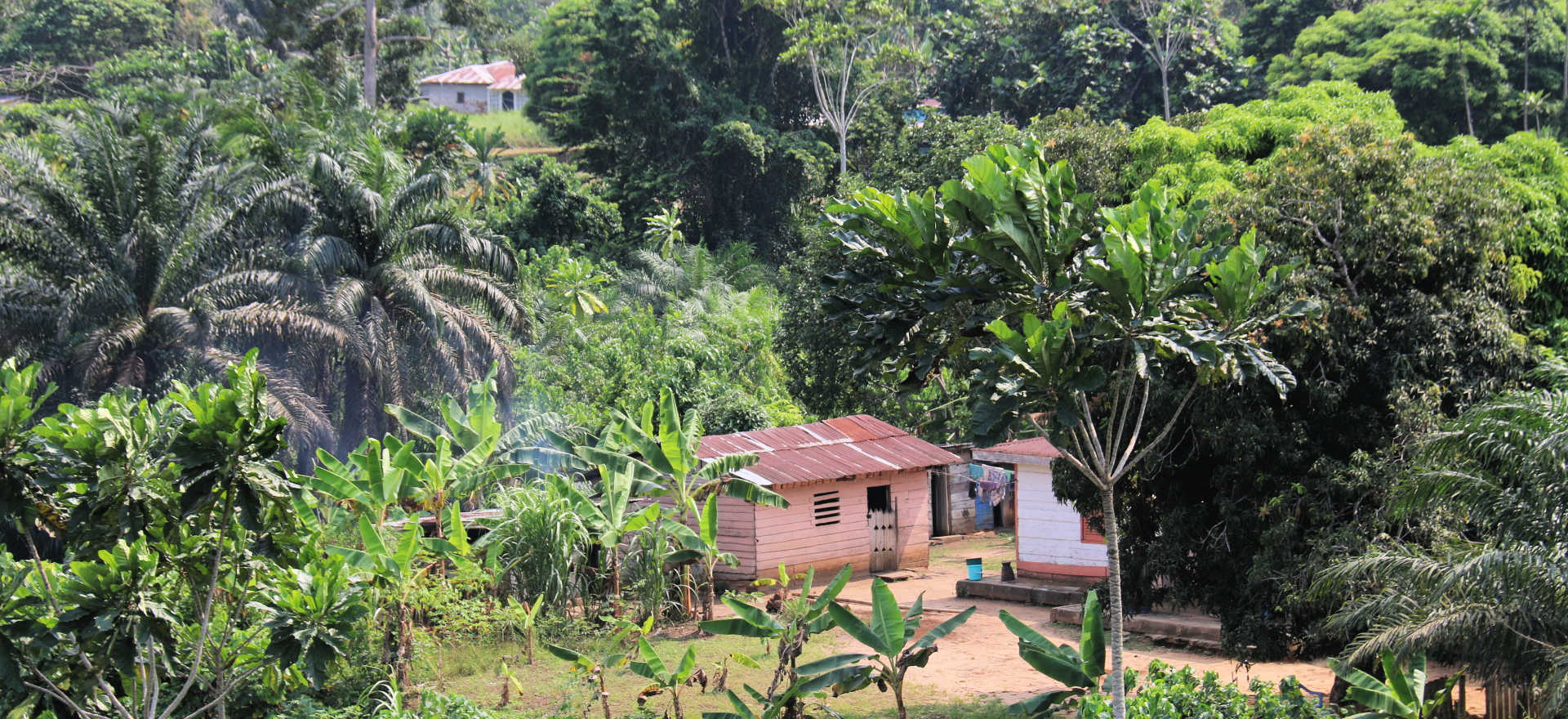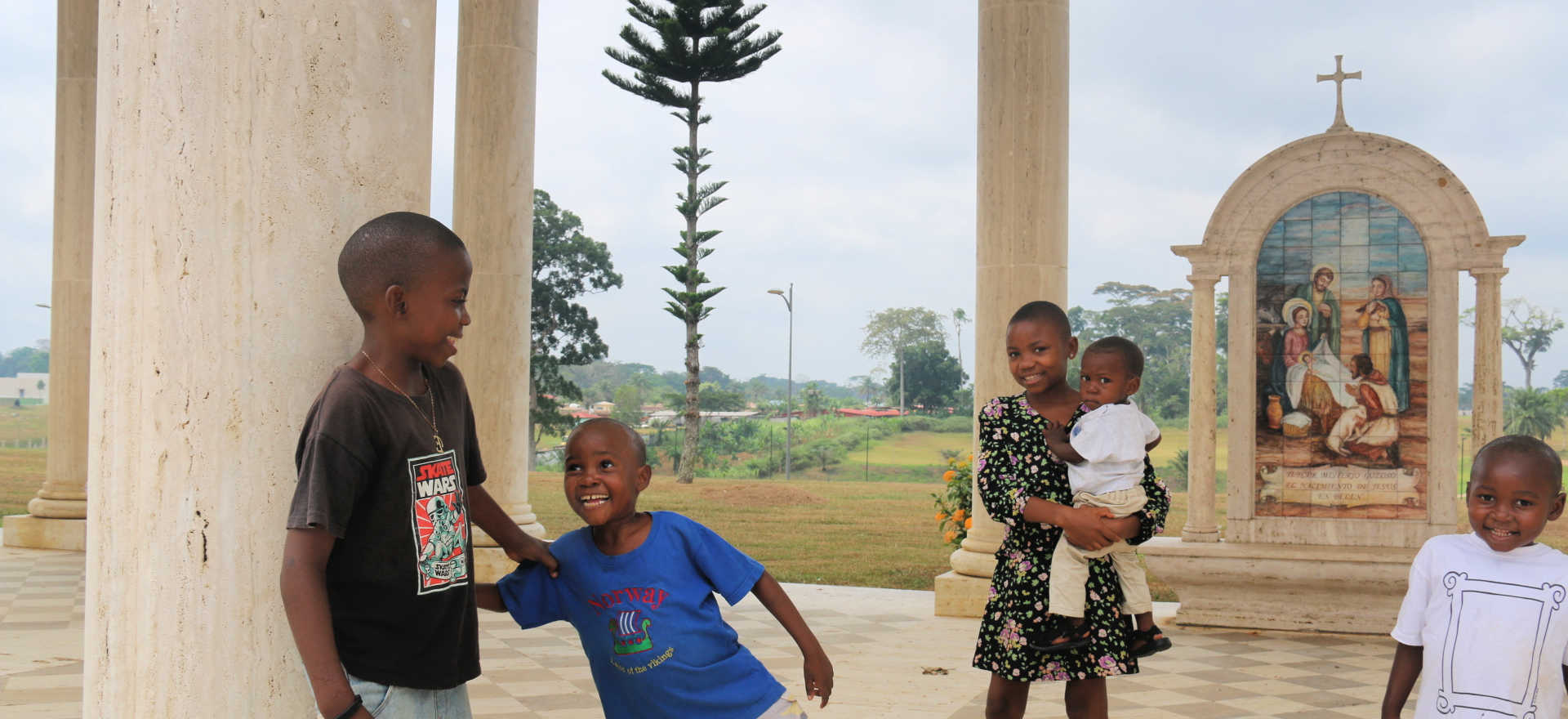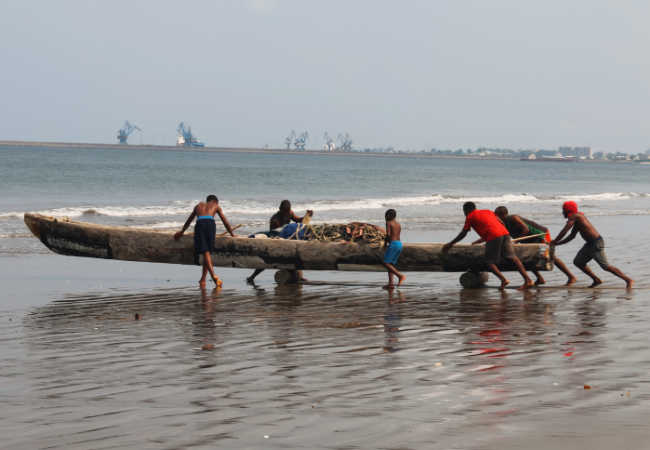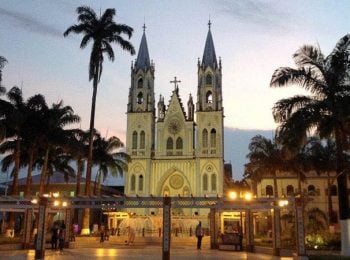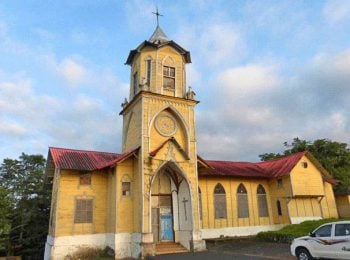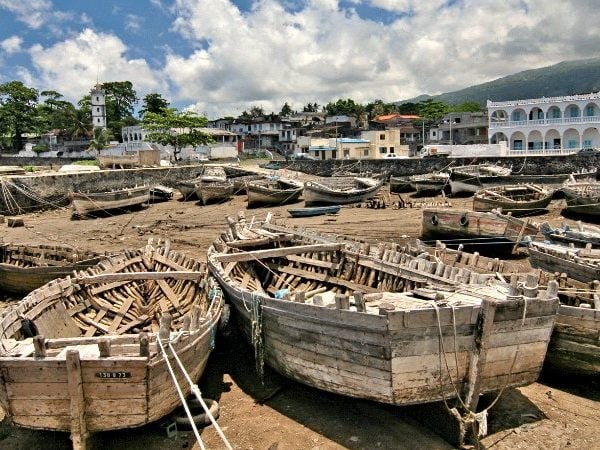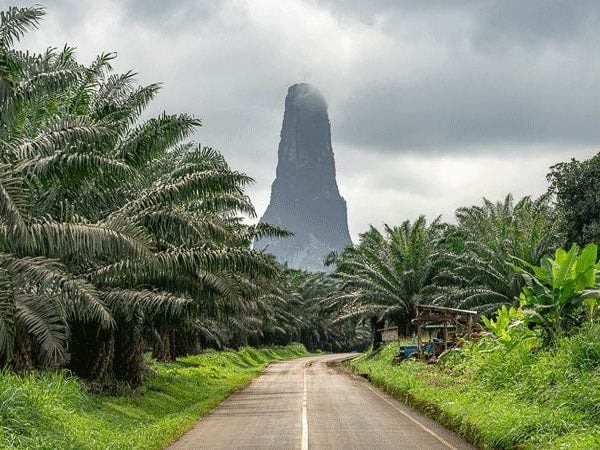Day 1 - Malabo
Day 2 - Malabo - Batete - Luba
Spend the morning exploring Equatorial Guinea’s capital. We visit the city centre with its colonial buildings dating back to the 19th century, including the neo- Gothic cathedral and Independence Square. We then head to Batete, home of the Bubi people, where we see a boarding school used by nuns, the colonial plaza and wood-built church. We also visit Luba with its white sand beach and old town which we explore. We visit the port, learning about the slave trade in Equatorial Guinea, and finish up back in Malabo at Arena Blanca Beach. Overnight Hotel Bahia 1 or similar. (B)
Day 3 - Malabo
Drive to Pico Basile, the highest peak in Equatorial Guinea, and drive to the summit for great views of the surrounding landscape. Upon reaching the summit we discover Bisila Church. Overnight Hotel Bahia 1 or similar. (B)
Day 4 - Bata
Fly from the island of Bioko to the continental part of Equatorial Guinea, and the city of Bata. Far bigger than Malabo, this is the heart of the nation, and we explore the city including its cathedral and markets, to get a feel for life on mainland EG. Overnight Ibis Hotel or similar. (B)
Day 5 - Mongomo - Oyala
Drive through the forested inland plateau to the city of Mongomo, where its connections to the ruling dynasty have resulted in a series of impressive building projects. From here continue to the new capital of Oyala, still under construction and promising to be filled with skyscrapers and glitzy modern buildings when completed, a far cry from the village that once existed here. Overnight Hotel Djibloho or similar. (B)
Day 6 - Monte Alen National Park - Bata
Explore Mongomo in the morning, visiting Presidents’ Square, the Central Market, and the enormous basilica modelled on St Peter’s in Rome. After, we drive to Monte Alen National Park, home to forest elephants, gorillas and chimpanzees. Although this wildlife is hard to spot, we will take a short walk through the rainforest before returning to Bata for the evening. Overnight Ibis Hotel or similar. (B)
Day 7 - Bata – Ndjanmanguila – Malabo
Take a canoe ride through lush mangroves keeping our eyes peeled for wildlife such as toucans, primates and snakes. We reach a local farm and meet a Combe family, one of the five main ethnic groups in Equatorial Guinea. Fly back to Malabo in the afternoon. Overnight Hotel Bahia 1 or similar. (B)
Day 8 - Ureka - Moaba
Head to Ureka on the coast and from here we embark on a hike via dense forests and cascading waterfalls. As the sun sets on the beach, we look out for turtles coming ashore to lay their eggs. Since 1996 the villagers here have worked as guards to patrol the beaches during nesting season, as part of an NGO protection project. Overnight camping. (BLD)
Day 9 - Moka - Malabo
Travel to Moka where we explore the village and its surrounding areas. Located on the heights of the volcanic massif, Moka is a good place to appreciate the island’s endemic forest and learn about the culture of the Bubi people. In the afternoon we visit the Moka Wildlife Centre. Overnight Hotel Bahia 1 or similar. (B)
Day 10 - Malabo
Transfer to the airport for your flight home. (B)
What's included?
What's not included?
Visas
All travellers will require a visa to enter Equatorial Guinea, which must be obtained before travel. E-Visas can be obtained through this link: https://equatorialguinea-evisa.com/
Visa regulations can change however and so we recommend that you contact your nearest embassy for the most up to date information.
Health and vaccinations
We are not medically qualified and so we recommend that you speak to your doctor or nearest health professional for advice concerning recommended vaccinations. For more advice on vaccinations, you can also visit https://travelhealthpro.org.uk/countries.
Please note that Yellow Fever is a compulsory vaccination for entering Equatorial Guinea and you must bring your vaccination certificate with you, otherwise you may not be allowed to enter.
If you have any physical limitations that might impact your ability to participate in the planned tour activities, it’s essential that you make us aware as soon as possible so that we can discuss this with you.
Insurance
It is a condition of joining our tours that you have suitable travel insurance in place, and we cannot accept travellers without insurance. All policies differ in terms of what they will cover, but as a minimum you need medical and health cover which will cover you for the whole time that you are away. Most policies will also include cancellation cover, which will cover you if an unforeseen circumstance obliges you to cancel your trip. We recommend that you obtain your insurance as soon as you book your trip.
Please note that government travel warnings often affect the validity of your travel insurance, and you should check this with your insurance company.
Money
The local currency in Equatorial Guinea is the Central African CFA, a currency that is shared with many other countries in the region. It is not, however, the same as the West African CFA, and the two are not interchangeable. It is best to bring Euros for exchange purposes as the CFA is not obtainable outside of the region.
Local conditions
When travelling to some of the destinations we offer you need to bear in mind that things won’t always work here as we’re used to them working at home. Travelling in underdeveloped and untouristed destinations requires both patience and a sense of humour. There may be problems with infrastructure, attitudes may be different, and maintenance may not be as high a standard as we would always like, but this is very much part and parcel of travelling in such a place.
In addition, roads throughout the parts of Africa that we visit are often poorly maintained (if at all!) and distances between key sites of interest can be long. Travelling in Africa can be tiring, hot and dusty at times, and inevitably it can be frustrating. While there are some issues that we are able to solve, others are intrinsic to the countries that we travel through, and you should be aware that many of the countries that we operate in cannot be compared to others on the continent that have better infrastructure – for example the popular tourist destinations of east and southern Africa.
Although travelling in these countries can at times be an ‘unpolished’ experience, this is all part of the adventure. We aim to resolve any issues as quickly as possible, and putting up with a pothole (or ten) is undeniably worth it for the amazing sights and cultural experiences you will encounter along the way.
Travelling in Equatorial Guinea can be more challenging than many people expect, and you should be prepared for this.
Almost all western visitors to Equatorial Guinea are here for business, and the concept of tourism is not particularly well understood, even by those working in the industry. You can expect officials and police to ask questions along the way, and we ask that you let your guide deal with these. Despite the reputation, most encounters with officials tend to be dominated by curiosity rather than anything else.
Travel advice
We keep a very close eye on the travel advice issued by the UK Foreign and Commonwealth Office so that we can keep you up to date with any warnings. At the time of writing the FCO does not advise against travel to any parts of Equatorial Guinea.
This relates to advice from the British government – other nationalities need to check the stance of their own governments.
Please note that the information contained above is highly susceptible to change, and while we endeavour to keep up to date we recommend that you use this as a guide only. Should you have any questions, please don’t hesitate to contact us.
